Unit12 What did you do last weekend?单元考点精讲课件(40张PPT)
文档属性
| 名称 | Unit12 What did you do last weekend?单元考点精讲课件(40张PPT) | 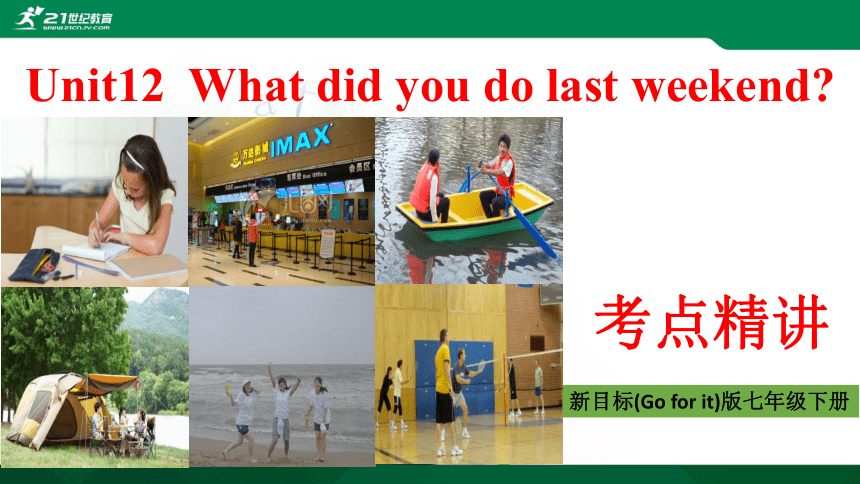 | |
| 格式 | pptx | ||
| 文件大小 | 2.5MB | ||
| 资源类型 | 试卷 | ||
| 版本资源 | 人教新目标(Go for it)版 | ||
| 科目 | 英语 | ||
| 更新时间 | 2023-01-29 21:32:28 | ||
图片预览

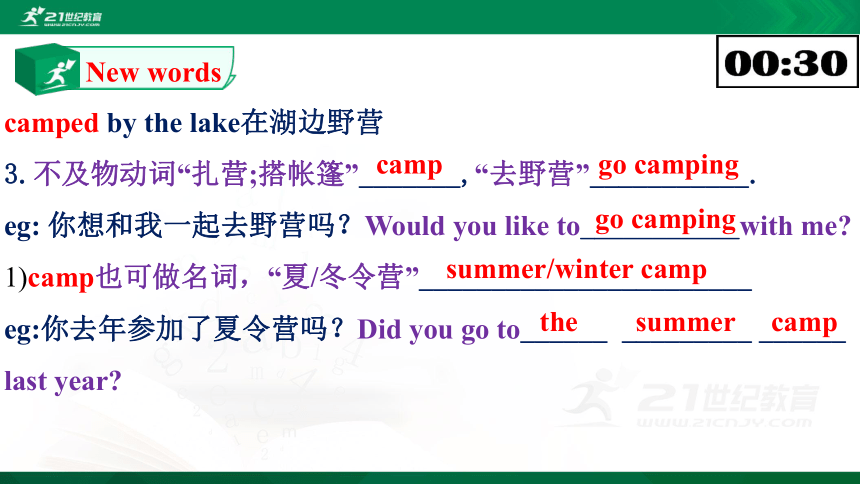
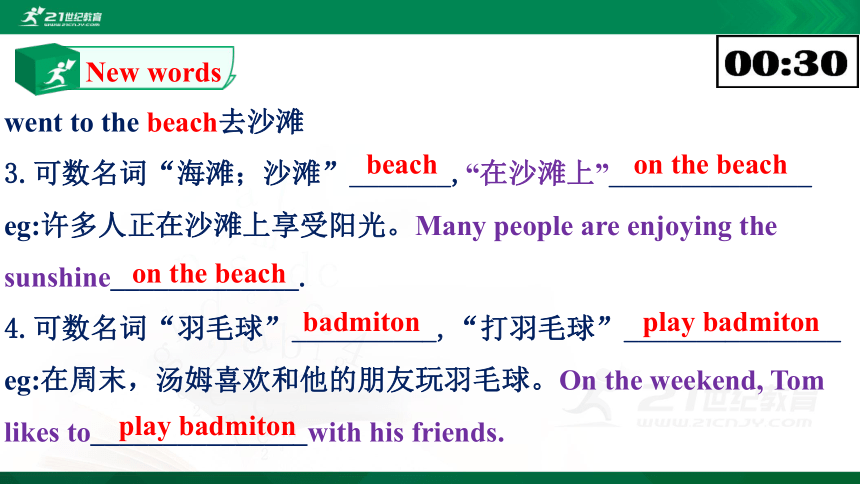
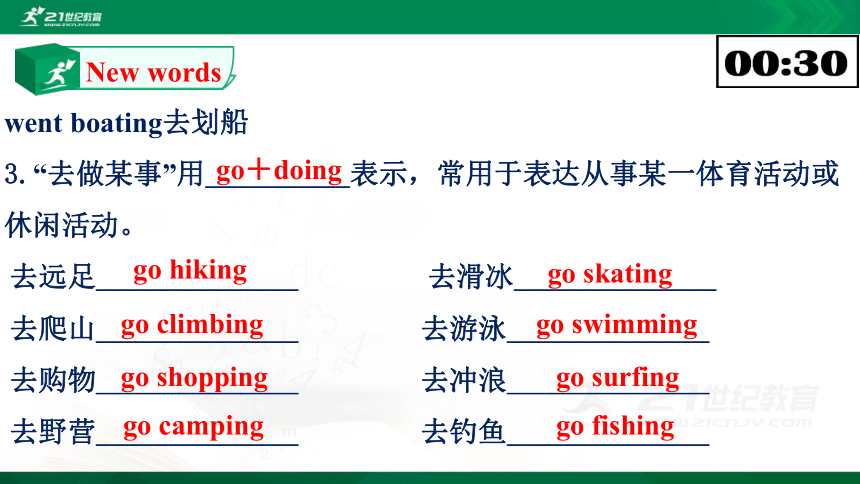
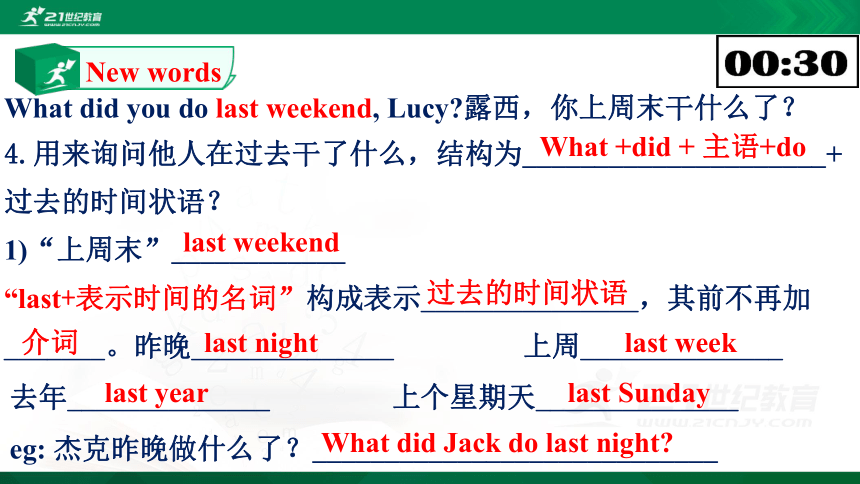
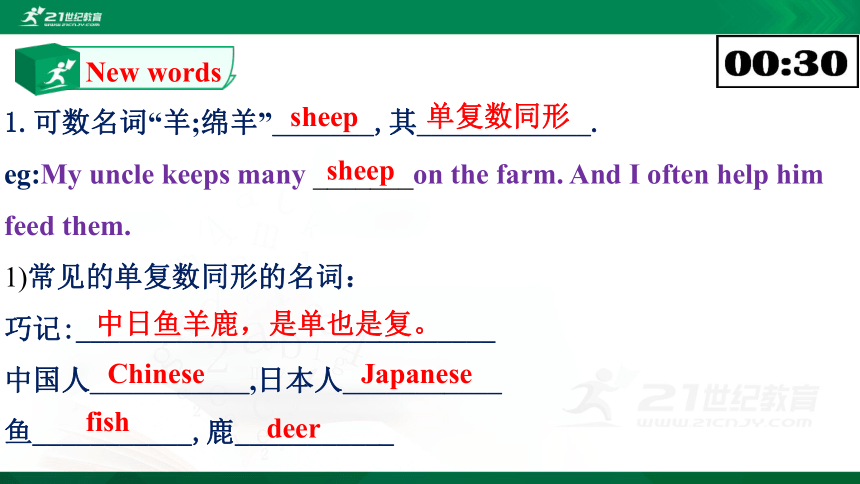
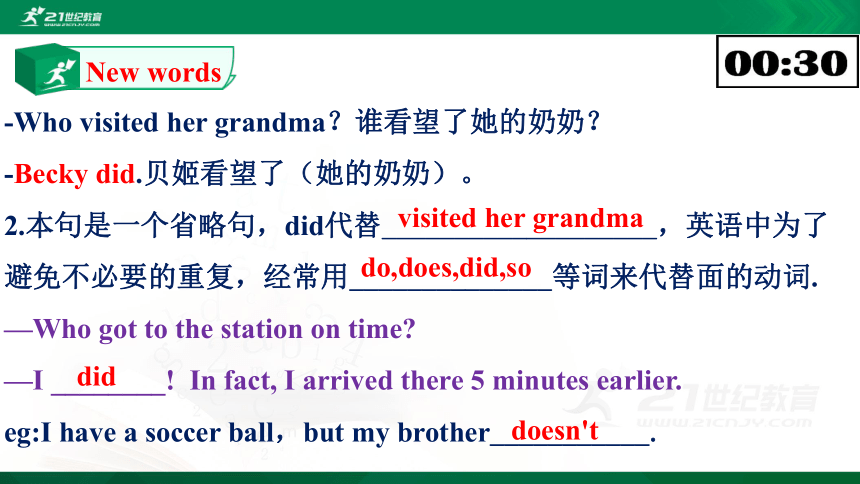
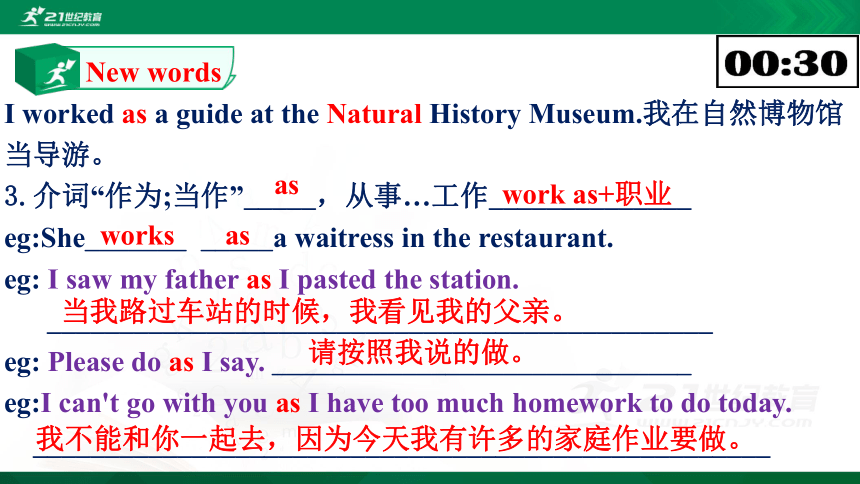
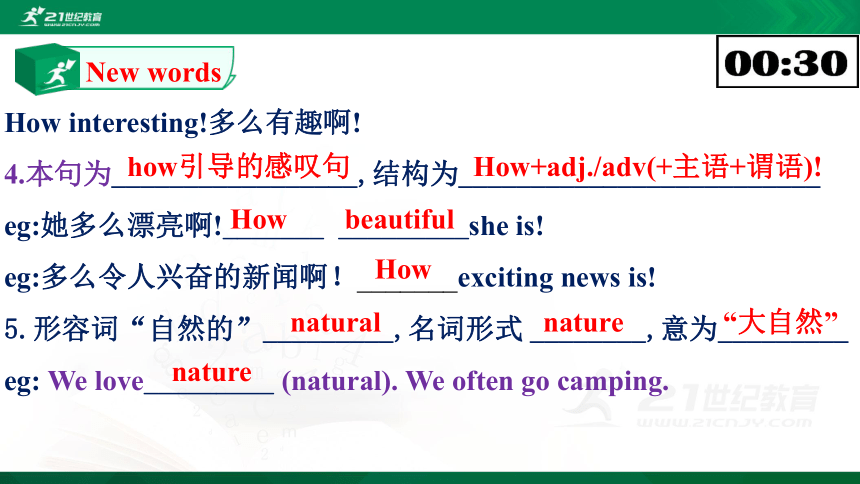
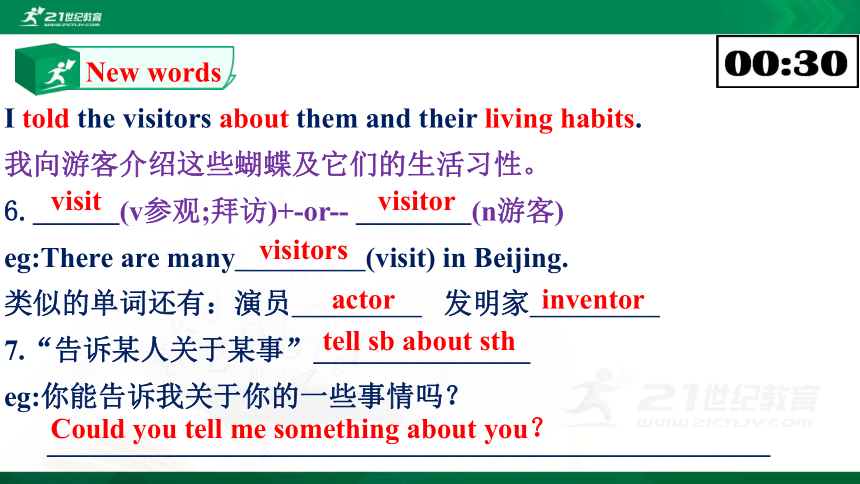
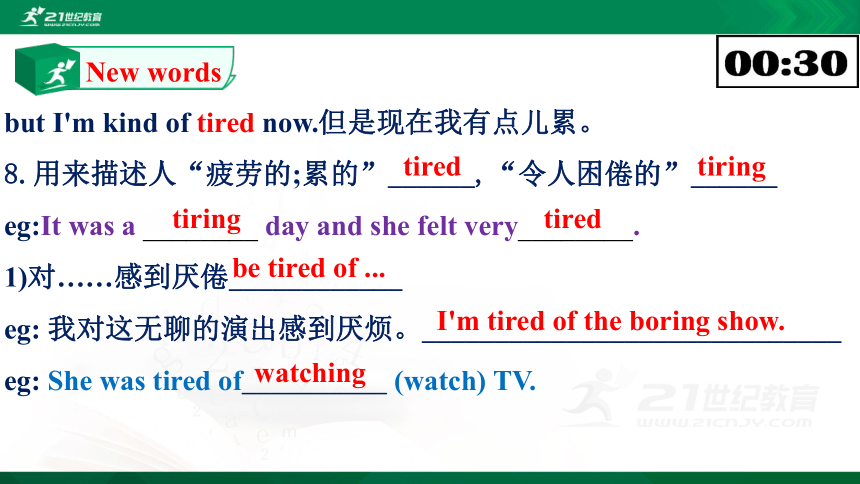
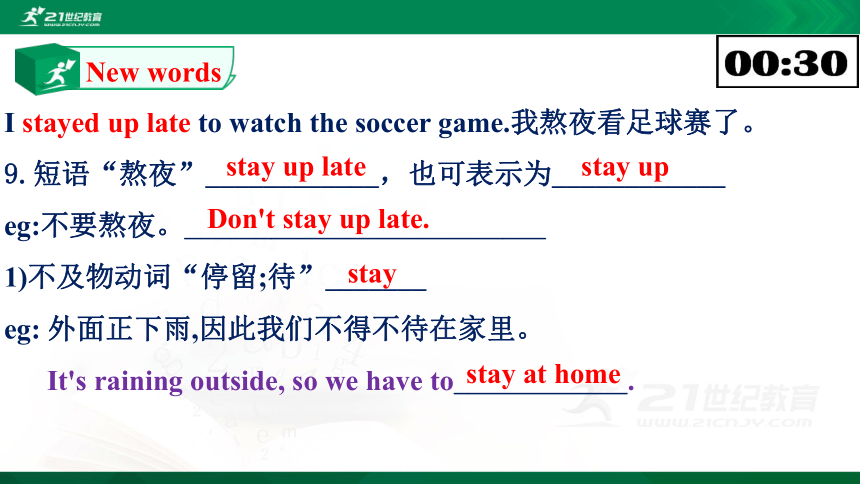
文档简介
(共40张PPT)
考点精讲
新目标(Go for it)版七年级下册
Unit12 What did you do last weekend
camped by the lake在湖边野营
3.不及物动词“扎营;搭帐篷”_______,“去野营”___________.
eg: 你想和我一起去野营吗?Would you like to___________with me
1)camp也可做名词,“夏/冬令营”_______________________
eg:你去年参加了夏令营吗?Did you go to______ _________ ______ last year
camp
go camping
New words
go camping
summer/winter camp
the summer camp
went to the beach去沙滩
3.可数名词“海滩;沙滩”_______,“在沙滩上”______________
eg:许多人正在沙滩上享受阳光。Many people are enjoying the sunshine_____________.
4.可数名词“羽毛球”__________,“打羽毛球”_______________
eg:在周末,汤姆喜欢和他的朋友玩羽毛球。On the weekend, Tom likes to_______________with his friends.
beach
on the beach
New words
on the beach
badmiton
play badmiton
play badmiton
went boating去划船
3.“去做某事”用__________表示,常用于表达从事某一体育活动或休闲活动。
去远足______________ 去滑冰______________
去爬山______________ 去游泳______________
去购物______________ 去冲浪______________
去野营______________ 去钓鱼______________
go+doing
go hiking
New words
go skating
go climbing
go swimming
go fishing
go shopping
go surfing
go camping
What did you do last weekend, Lucy 露西,你上周末干什么了?
4.用来询问他人在过去干了什么,结构为_____________________+ 过去的时间状语?
1)“上周末”____________
“last+表示时间的名词”构成表示_______________,其前不再加
_______。昨晚______________ 上周______________
去年______________ 上个星期天______________
eg: 杰克昨晚做什么了?____________________________
What +did + 主语+do
last weekend
New words
过去的时间状语
介词
last night
last week
last year
last Sunday
What did Jack do last night
1.可数名词“羊;绵羊”_______,其____________.
eg:My uncle keeps many _______on the farm. And I often help him feed them.
1)常见的单复数同形的名词:
巧记:_____________________________
中国人___________,日本人___________
鱼___________,鹿___________
sheep
单复数同形
New words
sheep
中日鱼羊鹿,是单也是复。
Chinese
Japanese
fish
deer
-Who visited her grandma?谁看望了她的奶奶?
-Becky did.贝姬看望了(她的奶奶)。
2.本句是一个省略句,did代替___________________,英语中为了避免不必要的重复,经常用______________等词来代替面的动词.
—Who got to the station on time
—I ________! In fact, I arrived there 5 minutes earlier.
eg:I have a soccer ball,but my brother___________.
visited her grandma
do,does,did,so
New words
did
doesn't
I worked as a guide at the Natural History Museum.我在自然博物馆当导游。
3.介词“作为;当作”_____,从事…工作______________ eg:She_______ _____a waitress in the restaurant.
eg: I saw my father as I pasted the station.
______________________________________________
eg: Please do as I say. _____________________________
eg:I can't go with you as I have too much homework to do today.
___________________________________________________
as
work as+职业
New words
works as
当我路过车站的时候,我看见我的父亲。
请按照我说的做。
我不能和你一起去,因为今天我有许多的家庭作业要做。
How interesting!多么有趣啊!
4.本句为_________________,结构为_________________________
eg:她多么漂亮啊!_______ _________she is!
eg:多么令人兴奋的新闻啊!_______exciting news is!
5.形容词“自然的”_________,名词形式 ________,意为_________
eg: We love_________ (natural). We often go camping.
how引导的感叹句
How+adj./adv(+主语+谓语)!
New words
How beautiful
How
natural
nature
“大自然”
nature
I told the visitors about them and their living habits.
我向游客介绍这些蝴蝶及它们的生活习性。
6.______(v参观;拜访)+-or-- ________(n游客)
eg:There are many_________(visit) in Beijing.
类似的单词还有:演员_________ 发明家_________
7.“告诉某人关于某事”_______________
eg:你能告诉我关于你的一些事情吗?
__________________________________________________
visit
visitor
New words
visitors
actor
inventor
tell sb about sth
Could you tell me something about you?
but I'm kind of tired now.但是现在我有点儿累。
8.用来描述人“疲劳的;累的”______,“令人困倦的”______
eg:It was a ________ day and she felt very________.
1)对……感到厌倦____________
eg: 我对这无聊的演出感到厌烦。_____________________________
eg: She was tired of__________ (watch) TV.
tired
tiring
New words
tiring
tired
be tired of ...
I'm tired of the boring show.
watching
I stayed up late to watch the soccer game.我熬夜看足球赛了。
9.短语“熬夜”____________,也可表示为____________
eg:不要熬夜。_________________________
1)不及物动词“停留;待”_______
eg: 外面正下雨,因此我们不得不待在家里。
It's raining outside, so we have to____________.
stay up late
stay up
New words
Don't stay up late.
stay at home
stay
1.副词“离开;远离”_______,短语“跑开;逃跑”_________.
eg:A true friend will never ___________from you when you're in trouble.
A family of mice were in the kitchen on Saturday morning when they saw a big cat. 星期六早上老鼠一家正在厨房里,这时他们看到了一只大猫。
2.可数名词“老鼠”_______,复数为______
eg:How many ________(老鼠)are there in the kitchen
away
run away
New words
run away
mouse
mice
mice
Father Mouse shouted at the cat, “Woof, woof!” 鼠爸爸冲着猫大叫:汪汪,汪汪。
2.不及物动词“呼叫;喊叫”_______
冲……大声叫嚷___________,多指因生气或愤怒冲某人大声吼。
eg:He was so angry that he shouted______everyone.
对……大声喊叫___________,目的是让别人听见,多因距离远
eg:To let me go home to have dinner,my mother ___________me.
shout
shout at
New words
at
shout to
shout to
"Well, son, that's why it's important to learn a second language,"
“所以嘛,儿子,那就是为什么再学好一门语言的重要性。”
3.句型“那就是……的原因______________。”why 引导表语从句, why 后跟的是结果。
eg:Tom got up late this morning.___________he was late for school.
句型“那是因为……”_______________,because后接的是原因。
eg:Tom was late for school. ________________he got up late this morning.
That’s why...
That's why
New words
That's because...
That's because...
4.名词“语言”__________,“又一门语言”__________________
eg:How many _________ can you speak
eg:He bought a second house in the city.
__________________________________
eg: Mary is the second student in our class.
__________________________________
language
a second language
New words
languages
他在这座城市里又买了一套房。
玛丽是我们班第二名的学生。
疑问词 意思 询问对象 疑问词 意思 询问对象
who why
whom how
what how old
where how long
when how far
what time how often
谁(主语)
人
谁(宾语)
人
什么
物
在哪里
地点
什么时候
时间
几点
点钟
为什么
原因
怎样;如何
状况
几岁
年龄
多长
长度
多远
距离
多久一次
频率
确定疑问词
Grammar
含有be动词的一般过去时的特殊疑问句
①特殊疑问句:________________________________________
你的寒假怎么样 ______ _______your winter vacation
②特殊疑问句:______________________________(对主语提问)
昨天下午谁在教室 _____ ____in the classrome yesterday afternoon
疑问词+was/were+主语+其他
How was
Grammar
疑问词+was/were+其他
Who was
确定特殊疑问句结构
含有实义动词的一般过去时的特殊疑问句
①特殊疑问句:________________________________________
I went to the mountain yesterday.(对划线部分提问)
_______did you_______yesterday?
②特殊疑问句:______________________________(对主语提问)
谁和你去的那儿?_____ ______there with you
疑问词+did+主语+动词原形+其他
What do
Grammar
疑问词+动词过去式+其他
Who went
确定特殊疑问句结构
1.及物动词“放飞(风筝)”____,过去式为_______
eg:Some children are having hun_________their kites.(fly)
2)fly也可作不及物动词,意为"乘飞机;飞;飞逝"."乘飞机去"_______,相当于___________________
eg:Her father_____ ___Guangzhou yesterday.
= Her father_______ ___Guangzhou_____ ___________yesterday.
3)fly作可数名词“苍蝇”
看!桌子上有两只苍蝇。Look!Two_______are on the table.
fly
flew
New words
flying
fly to
go to...by plane/air
flew to
went to
by air/plane
flies
swim in a swimming pool 在游泳池里游泳
2.swim过去式_______,动名词形式___________,动词-ing作定语通常表示用途,放在被修饰的名词前。常见的类似表达还有:
阅览室_______________ 起居室_______________
候车室_______________
swam
swimming
New words
reading room
living room
waiting room
Did you do anything interesting last weekend
上周末你做有趣的事情了吗
3.anything interesting意为 ____________,形容词修饰复合不定代词时,遵循___________。
eg:—Is there_____________________in today’s newspaper
—No. I think everything in it is boring.
“有趣的事”
anything interesting
Review
“不形原则”
New words
词语 用法 反义词 例句
tall 表示_____的事物,高度大于宽度 一个高个儿男人
一幢高楼
一棵高树
一座高山
一堵高墙
高价
high 表示_____的事物,宽度大于高度 窄
宽
short
low
a tall man
a tall building
a tall tree
a high mountain
a high wall
high prices
My sister finished high school two weeks ago.我姐姐两周前中学毕业了。
辨析tall与high
2)high作副词“高地”,修饰动词。
eg:He can jump high.______________________________
2.副词“以前”______,不可以单独使用,结构为_________________,可作为判断____________的依据。
eg:Jack_________to play the guitar two months ago.(start)
他可以跳得很高。
ago
Review
“一段时间+ago”
一般过去时
started
There we put up our tents and made a fire to keep us warm and cook food on.在那里我们搭起帐篷,生火取暖并做饭。
3.“搭起”________,还意为“举起;张贴;建造”。是__________型短语, 注意_____________,put的过去式仍为______。
eg:Here is the tent.Let's put it up.______________________________
eg:He puts up his hand to ask a question.______________________
eg:You' d better put up a notice on the wall.______________________
4.“生火”_____________,make过去式为______。
put up
动词+副词
Review
代词放中间
put
帐篷在这儿。让我们把它搭起来吧
他举起手来问问题。
你最好在墙上贴一张布告。
make a fire
made
On the first night,we just sat under the moon and told each other stories.在第一天夜里,我们就坐在月亮下给彼此讲故事。
5.名词“月亮”________,属于独一无二的事物,常连用定冠词_____。
eg:There is no air or water on_____ ______.(月球上)
6.“互相;彼此”____________,在句中作动词或介词的宾语。
eg:当我们有不同意见时,应该相互理解。
When we have different ideas, we should understand______ ______.
moon
the
Review
the moon
each other
each other
But I was so tired that I went to sleep early.但是我太累了,所以早早就睡了。
7."如此……以至于....”_______________________
eg:He is______young______he can't go to school.
= He is too young to go to school._______________________
= She is not old enough to go to school._______________________
2)so that 意为_______________,引导目的状语从句。
eg:He got up early so that he could catch the bus.
______________________________________________________
so+形/副词+that从句
她太小了而不能去上学。
Review
so that
她还不够大,不能去上学。
他起得很早,以便能赶上公共汽车。
“以便;为了”
The next morning, my sister and I got a terrible surprise.
8.“惊讶 ;使吃惊”________,短语“大吃一惊”_________________
eg:I got a surprise when I saw him._______________________
eg:Bill looked at him in surprise._______________________
eg:To my surprise, he didn't pass the exam.
______________________________
eg:Peter didn't tell his parents that he was going home because he wanted to give them a _________.
surprise
当我看到他时我吃了一惊。
Review
get a terrible surprise
比尔惊讶地看着他。
surprise
令我吃惊的是,他没通过考试。
Review
辨析surprise, surprising与surprised
词语 词性 意思 用法 例句
surprise 这则坏消息没使他们吃惊。
The bad news didn't________them.
surprising 这则新闻很令人吃惊。
The news is very__________.
surprised 我们对这则惊人的消息感到吃惊。
昨天晚上他吃惊地看着我。
动词
使吃惊
surprise sb.
surprise
形容词
令人吃惊的
修饰物
surprising.
形容词
感到吃惊的
sb be surprised at sth
sb be surprised to do sth
We're surprised at the surprising news.
He was surprised to see me last night.
When we looked out of our tent,we saw a big snake sleeping near the fire.我们向帐篷外看时,看到了一条大蛇正在篝火旁睡觉。
9.“向…外看”___________,后接名词或代词,反义短语_________.
eg:Please don't_____ ______ ____the window in class.
2)look out还意为_________,相当于___________.
eg:Look out!Here comes a car._______________________
look out of
look out of
Review
look into
"当心"
当心!过来一辆小汽车。
be careful
New words
10.“看见某人正在做某事”_________________,强调看到的动作_________.
eg:I saw him__________basketball at nine in the morning. (play)
2)“看见某人做了某事”_________________,强调看到的动作_________或___________.
eg:I often see her________in the library.(read)
2)与see有相同用法的词还有:________ ________等。
see sb.doing sth.
正在进行
playing
see sb. do sth.
经常发生
整个过程
read
watch
hear
I was so scared that I couldn't move. 我是那么害怕,一动都不敢动.
11.形容词“惊慌的;吓坏了的”_______,修饰人
eg:He was scared of snakes.________________
eg:The little girl is scared to cross the road by herself.
__________________________________
2)scary意为_______________,修饰物
eg:The movie is really scary._____________________________
scared
他害怕蛇。
New words
这个小女孩害怕独自过马路。
“吓人的; 恐怖的”
这个电影真吓人。
New words
12.动词“移动;搬到...”________.
eg:Don't move,or you'll be in danger.__________________________
eg:My family moved to Beijing two years ago.
___________________________________
2)move还可以表示为________
eg:The movie moved me deeply. ______________________________
We shouted to our parents to let them know about the danger.我们大声喊我们的父母,想让他们知道危险所在。
move
不要动,否则你会有危险.
两年前我全家搬到了北京。
“感动”
这个电影深深地打动了我.
My dad started to jump up and down in their tent. 我爸爸开始在他们的帐篷内上下跳动。
13.动词“开始”_______,同义词________
eg:Finish your work before you start to play.
________________________________________
eg:The bus will start at 7 tomorrow.___________________________
eg:Our lesson started with an English song.
_____________________________
start
begin
New words
在你开始玩之前先完成工作。
公共汽车将于明天7点出发。
我们的课是以一首英文歌曲开始的。
New words
14.不及物动词“跳;跃”________.
eg:She jumped when she heard the news.
__________________________________
3.“上上下下;来回” _____________,在句中修饰动词。
eg:He uses a lift to go up and down.__________________________
jump
她听到那条消息时跳了起来。
up and down
他用电梯上上下下。
This woke the snake up and it moved into the forest near the lake.
这一举动惊醒了蛇,它爬进了湖边的森林里。
15.动词"弄醒;醒"______,过去式______,把某人弄醒_____________
eg:Don't wake him up.He will wake up in an hour.
________________________________________
wake
woke
New words
wake sb up
别叫醒他,他一小时后就会醒。
This was a very useful lesson for me.这对我来说是非常有用的经验。
16.名词"教训;经验"_______
eg:That accident taught them a lesson.
________________________________________
eg: Let's read the first lesson.___________________________
lesson
那次事故给了他们一个教训。
New words
咱们读第一课吧。
What an interesting job they have!他们有一份多么有趣的工作啊!
1.本句是what引导的感叹句。what引导的感叹句有下列三种形式
① _______+_______+形容词+______________(+主语+谓语)!
eg:(它是)一本多么有用的书啊!__________useful book (it is)!
②_______+形容词+______________(+主语+谓语)!
eg:(它们是)多么美丽的山啊!______beautiful mountains( they are)!
③______+形容词+____________(+主语+谓语)!
eg:(那是)多好的天气啊!______fine weather(it is)!
What a/an 可数名词单数
What 可数名词复数
Main points
What a
What
What
What 不可数名词
2.how引导的感叹句结构:_________________________
eg:她多么漂亮啊!_______ _________she is!
eg:多么令人兴奋的新闻啊!_______exciting news is!
口诀:
感叹句,并不难,______和______放前面;
____________形加名,不可数、复数______去;
形容、副词在______后,莫忘叹号在句末。
How+adj./adv(+主语+谓语)!
How beautiful
How
what how
what a(an)
a(an)
how
Main points
Let’s do
翻译,分别用how与what陈述:
1.多么好看的一朵花!
What a beautiful flower it is!
How beautiful the flower is!
2.多么大的一面墙!
What a big wall it is!
How big the wall is!
3.多么有用的一本书
What a useful book it is!
How useful the book is!
考点精讲
新目标(Go for it)版七年级下册
Unit12 What did you do last weekend
camped by the lake在湖边野营
3.不及物动词“扎营;搭帐篷”_______,“去野营”___________.
eg: 你想和我一起去野营吗?Would you like to___________with me
1)camp也可做名词,“夏/冬令营”_______________________
eg:你去年参加了夏令营吗?Did you go to______ _________ ______ last year
camp
go camping
New words
go camping
summer/winter camp
the summer camp
went to the beach去沙滩
3.可数名词“海滩;沙滩”_______,“在沙滩上”______________
eg:许多人正在沙滩上享受阳光。Many people are enjoying the sunshine_____________.
4.可数名词“羽毛球”__________,“打羽毛球”_______________
eg:在周末,汤姆喜欢和他的朋友玩羽毛球。On the weekend, Tom likes to_______________with his friends.
beach
on the beach
New words
on the beach
badmiton
play badmiton
play badmiton
went boating去划船
3.“去做某事”用__________表示,常用于表达从事某一体育活动或休闲活动。
去远足______________ 去滑冰______________
去爬山______________ 去游泳______________
去购物______________ 去冲浪______________
去野营______________ 去钓鱼______________
go+doing
go hiking
New words
go skating
go climbing
go swimming
go fishing
go shopping
go surfing
go camping
What did you do last weekend, Lucy 露西,你上周末干什么了?
4.用来询问他人在过去干了什么,结构为_____________________+ 过去的时间状语?
1)“上周末”____________
“last+表示时间的名词”构成表示_______________,其前不再加
_______。昨晚______________ 上周______________
去年______________ 上个星期天______________
eg: 杰克昨晚做什么了?____________________________
What +did + 主语+do
last weekend
New words
过去的时间状语
介词
last night
last week
last year
last Sunday
What did Jack do last night
1.可数名词“羊;绵羊”_______,其____________.
eg:My uncle keeps many _______on the farm. And I often help him feed them.
1)常见的单复数同形的名词:
巧记:_____________________________
中国人___________,日本人___________
鱼___________,鹿___________
sheep
单复数同形
New words
sheep
中日鱼羊鹿,是单也是复。
Chinese
Japanese
fish
deer
-Who visited her grandma?谁看望了她的奶奶?
-Becky did.贝姬看望了(她的奶奶)。
2.本句是一个省略句,did代替___________________,英语中为了避免不必要的重复,经常用______________等词来代替面的动词.
—Who got to the station on time
—I ________! In fact, I arrived there 5 minutes earlier.
eg:I have a soccer ball,but my brother___________.
visited her grandma
do,does,did,so
New words
did
doesn't
I worked as a guide at the Natural History Museum.我在自然博物馆当导游。
3.介词“作为;当作”_____,从事…工作______________ eg:She_______ _____a waitress in the restaurant.
eg: I saw my father as I pasted the station.
______________________________________________
eg: Please do as I say. _____________________________
eg:I can't go with you as I have too much homework to do today.
___________________________________________________
as
work as+职业
New words
works as
当我路过车站的时候,我看见我的父亲。
请按照我说的做。
我不能和你一起去,因为今天我有许多的家庭作业要做。
How interesting!多么有趣啊!
4.本句为_________________,结构为_________________________
eg:她多么漂亮啊!_______ _________she is!
eg:多么令人兴奋的新闻啊!_______exciting news is!
5.形容词“自然的”_________,名词形式 ________,意为_________
eg: We love_________ (natural). We often go camping.
how引导的感叹句
How+adj./adv(+主语+谓语)!
New words
How beautiful
How
natural
nature
“大自然”
nature
I told the visitors about them and their living habits.
我向游客介绍这些蝴蝶及它们的生活习性。
6.______(v参观;拜访)+-or-- ________(n游客)
eg:There are many_________(visit) in Beijing.
类似的单词还有:演员_________ 发明家_________
7.“告诉某人关于某事”_______________
eg:你能告诉我关于你的一些事情吗?
__________________________________________________
visit
visitor
New words
visitors
actor
inventor
tell sb about sth
Could you tell me something about you?
but I'm kind of tired now.但是现在我有点儿累。
8.用来描述人“疲劳的;累的”______,“令人困倦的”______
eg:It was a ________ day and she felt very________.
1)对……感到厌倦____________
eg: 我对这无聊的演出感到厌烦。_____________________________
eg: She was tired of__________ (watch) TV.
tired
tiring
New words
tiring
tired
be tired of ...
I'm tired of the boring show.
watching
I stayed up late to watch the soccer game.我熬夜看足球赛了。
9.短语“熬夜”____________,也可表示为____________
eg:不要熬夜。_________________________
1)不及物动词“停留;待”_______
eg: 外面正下雨,因此我们不得不待在家里。
It's raining outside, so we have to____________.
stay up late
stay up
New words
Don't stay up late.
stay at home
stay
1.副词“离开;远离”_______,短语“跑开;逃跑”_________.
eg:A true friend will never ___________from you when you're in trouble.
A family of mice were in the kitchen on Saturday morning when they saw a big cat. 星期六早上老鼠一家正在厨房里,这时他们看到了一只大猫。
2.可数名词“老鼠”_______,复数为______
eg:How many ________(老鼠)are there in the kitchen
away
run away
New words
run away
mouse
mice
mice
Father Mouse shouted at the cat, “Woof, woof!” 鼠爸爸冲着猫大叫:汪汪,汪汪。
2.不及物动词“呼叫;喊叫”_______
冲……大声叫嚷___________,多指因生气或愤怒冲某人大声吼。
eg:He was so angry that he shouted______everyone.
对……大声喊叫___________,目的是让别人听见,多因距离远
eg:To let me go home to have dinner,my mother ___________me.
shout
shout at
New words
at
shout to
shout to
"Well, son, that's why it's important to learn a second language,"
“所以嘛,儿子,那就是为什么再学好一门语言的重要性。”
3.句型“那就是……的原因______________。”why 引导表语从句, why 后跟的是结果。
eg:Tom got up late this morning.___________he was late for school.
句型“那是因为……”_______________,because后接的是原因。
eg:Tom was late for school. ________________he got up late this morning.
That’s why...
That's why
New words
That's because...
That's because...
4.名词“语言”__________,“又一门语言”__________________
eg:How many _________ can you speak
eg:He bought a second house in the city.
__________________________________
eg: Mary is the second student in our class.
__________________________________
language
a second language
New words
languages
他在这座城市里又买了一套房。
玛丽是我们班第二名的学生。
疑问词 意思 询问对象 疑问词 意思 询问对象
who why
whom how
what how old
where how long
when how far
what time how often
谁(主语)
人
谁(宾语)
人
什么
物
在哪里
地点
什么时候
时间
几点
点钟
为什么
原因
怎样;如何
状况
几岁
年龄
多长
长度
多远
距离
多久一次
频率
确定疑问词
Grammar
含有be动词的一般过去时的特殊疑问句
①特殊疑问句:________________________________________
你的寒假怎么样 ______ _______your winter vacation
②特殊疑问句:______________________________(对主语提问)
昨天下午谁在教室 _____ ____in the classrome yesterday afternoon
疑问词+was/were+主语+其他
How was
Grammar
疑问词+was/were+其他
Who was
确定特殊疑问句结构
含有实义动词的一般过去时的特殊疑问句
①特殊疑问句:________________________________________
I went to the mountain yesterday.(对划线部分提问)
_______did you_______yesterday?
②特殊疑问句:______________________________(对主语提问)
谁和你去的那儿?_____ ______there with you
疑问词+did+主语+动词原形+其他
What do
Grammar
疑问词+动词过去式+其他
Who went
确定特殊疑问句结构
1.及物动词“放飞(风筝)”____,过去式为_______
eg:Some children are having hun_________their kites.(fly)
2)fly也可作不及物动词,意为"乘飞机;飞;飞逝"."乘飞机去"_______,相当于___________________
eg:Her father_____ ___Guangzhou yesterday.
= Her father_______ ___Guangzhou_____ ___________yesterday.
3)fly作可数名词“苍蝇”
看!桌子上有两只苍蝇。Look!Two_______are on the table.
fly
flew
New words
flying
fly to
go to...by plane/air
flew to
went to
by air/plane
flies
swim in a swimming pool 在游泳池里游泳
2.swim过去式_______,动名词形式___________,动词-ing作定语通常表示用途,放在被修饰的名词前。常见的类似表达还有:
阅览室_______________ 起居室_______________
候车室_______________
swam
swimming
New words
reading room
living room
waiting room
Did you do anything interesting last weekend
上周末你做有趣的事情了吗
3.anything interesting意为 ____________,形容词修饰复合不定代词时,遵循___________。
eg:—Is there_____________________in today’s newspaper
—No. I think everything in it is boring.
“有趣的事”
anything interesting
Review
“不形原则”
New words
词语 用法 反义词 例句
tall 表示_____的事物,高度大于宽度 一个高个儿男人
一幢高楼
一棵高树
一座高山
一堵高墙
高价
high 表示_____的事物,宽度大于高度 窄
宽
short
low
a tall man
a tall building
a tall tree
a high mountain
a high wall
high prices
My sister finished high school two weeks ago.我姐姐两周前中学毕业了。
辨析tall与high
2)high作副词“高地”,修饰动词。
eg:He can jump high.______________________________
2.副词“以前”______,不可以单独使用,结构为_________________,可作为判断____________的依据。
eg:Jack_________to play the guitar two months ago.(start)
他可以跳得很高。
ago
Review
“一段时间+ago”
一般过去时
started
There we put up our tents and made a fire to keep us warm and cook food on.在那里我们搭起帐篷,生火取暖并做饭。
3.“搭起”________,还意为“举起;张贴;建造”。是__________型短语, 注意_____________,put的过去式仍为______。
eg:Here is the tent.Let's put it up.______________________________
eg:He puts up his hand to ask a question.______________________
eg:You' d better put up a notice on the wall.______________________
4.“生火”_____________,make过去式为______。
put up
动词+副词
Review
代词放中间
put
帐篷在这儿。让我们把它搭起来吧
他举起手来问问题。
你最好在墙上贴一张布告。
make a fire
made
On the first night,we just sat under the moon and told each other stories.在第一天夜里,我们就坐在月亮下给彼此讲故事。
5.名词“月亮”________,属于独一无二的事物,常连用定冠词_____。
eg:There is no air or water on_____ ______.(月球上)
6.“互相;彼此”____________,在句中作动词或介词的宾语。
eg:当我们有不同意见时,应该相互理解。
When we have different ideas, we should understand______ ______.
moon
the
Review
the moon
each other
each other
But I was so tired that I went to sleep early.但是我太累了,所以早早就睡了。
7."如此……以至于....”_______________________
eg:He is______young______he can't go to school.
= He is too young to go to school._______________________
= She is not old enough to go to school._______________________
2)so that 意为_______________,引导目的状语从句。
eg:He got up early so that he could catch the bus.
______________________________________________________
so+形/副词+that从句
她太小了而不能去上学。
Review
so that
她还不够大,不能去上学。
他起得很早,以便能赶上公共汽车。
“以便;为了”
The next morning, my sister and I got a terrible surprise.
8.“惊讶 ;使吃惊”________,短语“大吃一惊”_________________
eg:I got a surprise when I saw him._______________________
eg:Bill looked at him in surprise._______________________
eg:To my surprise, he didn't pass the exam.
______________________________
eg:Peter didn't tell his parents that he was going home because he wanted to give them a _________.
surprise
当我看到他时我吃了一惊。
Review
get a terrible surprise
比尔惊讶地看着他。
surprise
令我吃惊的是,他没通过考试。
Review
辨析surprise, surprising与surprised
词语 词性 意思 用法 例句
surprise 这则坏消息没使他们吃惊。
The bad news didn't________them.
surprising 这则新闻很令人吃惊。
The news is very__________.
surprised 我们对这则惊人的消息感到吃惊。
昨天晚上他吃惊地看着我。
动词
使吃惊
surprise sb.
surprise
形容词
令人吃惊的
修饰物
surprising.
形容词
感到吃惊的
sb be surprised at sth
sb be surprised to do sth
We're surprised at the surprising news.
He was surprised to see me last night.
When we looked out of our tent,we saw a big snake sleeping near the fire.我们向帐篷外看时,看到了一条大蛇正在篝火旁睡觉。
9.“向…外看”___________,后接名词或代词,反义短语_________.
eg:Please don't_____ ______ ____the window in class.
2)look out还意为_________,相当于___________.
eg:Look out!Here comes a car._______________________
look out of
look out of
Review
look into
"当心"
当心!过来一辆小汽车。
be careful
New words
10.“看见某人正在做某事”_________________,强调看到的动作_________.
eg:I saw him__________basketball at nine in the morning. (play)
2)“看见某人做了某事”_________________,强调看到的动作_________或___________.
eg:I often see her________in the library.(read)
2)与see有相同用法的词还有:________ ________等。
see sb.doing sth.
正在进行
playing
see sb. do sth.
经常发生
整个过程
read
watch
hear
I was so scared that I couldn't move. 我是那么害怕,一动都不敢动.
11.形容词“惊慌的;吓坏了的”_______,修饰人
eg:He was scared of snakes.________________
eg:The little girl is scared to cross the road by herself.
__________________________________
2)scary意为_______________,修饰物
eg:The movie is really scary._____________________________
scared
他害怕蛇。
New words
这个小女孩害怕独自过马路。
“吓人的; 恐怖的”
这个电影真吓人。
New words
12.动词“移动;搬到...”________.
eg:Don't move,or you'll be in danger.__________________________
eg:My family moved to Beijing two years ago.
___________________________________
2)move还可以表示为________
eg:The movie moved me deeply. ______________________________
We shouted to our parents to let them know about the danger.我们大声喊我们的父母,想让他们知道危险所在。
move
不要动,否则你会有危险.
两年前我全家搬到了北京。
“感动”
这个电影深深地打动了我.
My dad started to jump up and down in their tent. 我爸爸开始在他们的帐篷内上下跳动。
13.动词“开始”_______,同义词________
eg:Finish your work before you start to play.
________________________________________
eg:The bus will start at 7 tomorrow.___________________________
eg:Our lesson started with an English song.
_____________________________
start
begin
New words
在你开始玩之前先完成工作。
公共汽车将于明天7点出发。
我们的课是以一首英文歌曲开始的。
New words
14.不及物动词“跳;跃”________.
eg:She jumped when she heard the news.
__________________________________
3.“上上下下;来回” _____________,在句中修饰动词。
eg:He uses a lift to go up and down.__________________________
jump
她听到那条消息时跳了起来。
up and down
他用电梯上上下下。
This woke the snake up and it moved into the forest near the lake.
这一举动惊醒了蛇,它爬进了湖边的森林里。
15.动词"弄醒;醒"______,过去式______,把某人弄醒_____________
eg:Don't wake him up.He will wake up in an hour.
________________________________________
wake
woke
New words
wake sb up
别叫醒他,他一小时后就会醒。
This was a very useful lesson for me.这对我来说是非常有用的经验。
16.名词"教训;经验"_______
eg:That accident taught them a lesson.
________________________________________
eg: Let's read the first lesson.___________________________
lesson
那次事故给了他们一个教训。
New words
咱们读第一课吧。
What an interesting job they have!他们有一份多么有趣的工作啊!
1.本句是what引导的感叹句。what引导的感叹句有下列三种形式
① _______+_______+形容词+______________(+主语+谓语)!
eg:(它是)一本多么有用的书啊!__________useful book (it is)!
②_______+形容词+______________(+主语+谓语)!
eg:(它们是)多么美丽的山啊!______beautiful mountains( they are)!
③______+形容词+____________(+主语+谓语)!
eg:(那是)多好的天气啊!______fine weather(it is)!
What a/an 可数名词单数
What 可数名词复数
Main points
What a
What
What
What 不可数名词
2.how引导的感叹句结构:_________________________
eg:她多么漂亮啊!_______ _________she is!
eg:多么令人兴奋的新闻啊!_______exciting news is!
口诀:
感叹句,并不难,______和______放前面;
____________形加名,不可数、复数______去;
形容、副词在______后,莫忘叹号在句末。
How+adj./adv(+主语+谓语)!
How beautiful
How
what how
what a(an)
a(an)
how
Main points
Let’s do
翻译,分别用how与what陈述:
1.多么好看的一朵花!
What a beautiful flower it is!
How beautiful the flower is!
2.多么大的一面墙!
What a big wall it is!
How big the wall is!
3.多么有用的一本书
What a useful book it is!
How useful the book is!
同课章节目录
- Unit 1 Can you play the guitar?
- Section A
- Section B
- Unit 2 What time do you go to school?
- Section A
- Section B
- Unit 3 How do you get to school?
- Section A
- Section B
- Unit 4 Don't eat in class.
- Section A
- Section B
- Unit 5 Why do you like pandas?
- Section A
- Section B
- Unit 6 I'm watching TV.
- Section A
- Section B
- Review of Units 1-6
- Unit 7 It's raining!
- Section A
- Section B
- Unit 8 Is there a post office near here?
- Section A
- Section B
- Unit 9 What does he look like?
- Section A
- Section B
- Unit 10 I'd like some noodles.
- Section A
- Section B
- Unit 11 How was your school trip?
- Section A
- Section B
- Unit 12 What did you do last weekend?
- Section A
- Section B
